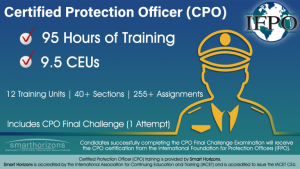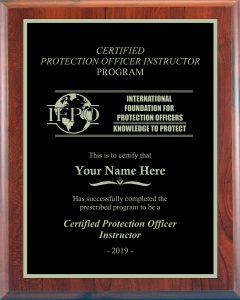In this essay, Chris A. Hertig, CPP, CPOI, and member of the IFPO Board of Directors, outlines a viable possibility for those looking to transition from either the military or law enforcement: A career as a Certified Protection Officer Instructor. -- IFPO.
Many military and law enforcement professionals have had instructional experience. It’s what they do. It might be full-time or part-time and it can cover a wide range of subjects.
Being able to use this in one’s career after military or police service ends is a good thing. Unfortunately, transitioning to the corporate/civilian world is complicated. There’s a substantial cultural disconnect. An abyss! There may be legal/regulatory roadblocks. Topical relevance is a further consideration.
As there has been varying/differing degrees of experience in security operations; it is incumbent upon the career builder to take stock of what they have. Next, they need to see how it can apply outside of their current employment. Then they need to critically evaluate how it will be viewed by those that would hire them.
Obviously, recognized credentials help in tying one’s experience together. When going through a certification process (the CPO) one learns new things and reiterates and expands upon what they already know. That’s where professional certs become “knowledge multipliers."
Certifications also are a part of our credentialized society, like it or not. They provide recognition above one’s peers. They demonstrate commitment by the person attaining them. They also aid in gaining interviews as the person doing the interview may be curious about the certification!
The Certified Protection Officer Instructor (CPOI) designation was developed in response to organizations desiring that the Certified Protection Officer (CPO) program be taught in a classroom environment. Today there are hundreds of CPOIs teaching for various organizations around the world. Individuals with teaching experience, security experience and who have completed the CPO designation may be eligible to become CPOIs. This is a natural fit for many military and law enforcement folks.
Visit ifpo.org for complete details.
________________________________________________________________________________________________________

Get certified and take your security career to the next level!
The International Foundation for Protection Officers (IFPO) is dedicated to providing meaningful and cost effective security training for security guards and protection officers.
We believe that education is a necessary and essential part of professional security training and the security officer’s background. IFPO serves individuals, security companies, and organizations that have their own private security staff. Our students and members benefit from the recognition and standing that the prestigious IFPO certification conveys.
LIKE and FOLLOW the IFPO on Facebook!
International Foundation for Protection Officers Mission Statement
Mission Statement Part I.
The International Foundation for Protection Officers provides professional learning opportunities for security practitioners, to impart the knowledge, skills, and competencies required to maximize job performance and enhance career potential.
Purpose: to make a positive difference in the quality of the participant’s job performance and elevate the professional status of students who partake of our learning opportunities.
Business: to supply committed security practitioners with a quality education to help achieve their highest potential and provide recognized accreditation for successful completion of educational goals.
Values: commitment, integrity, responsibility, and standards of excellence, provide the platform that supports our journey as we pursue our mission.
Vision Statement
Commitment to Excellence: To be the recognized center of excellence and primary provider of education and training products and services to the security industry.
Mission Statement Part II.
“The International Foundation for Protection Officers is committed to the support and professional development of protection officers and supervisors. Through advocacy, promoting training standards, and providing accessible training, education and certification opportunities, we seek to enhance their professional standing as well as increase and diversify the value of the vital services they provide.”


